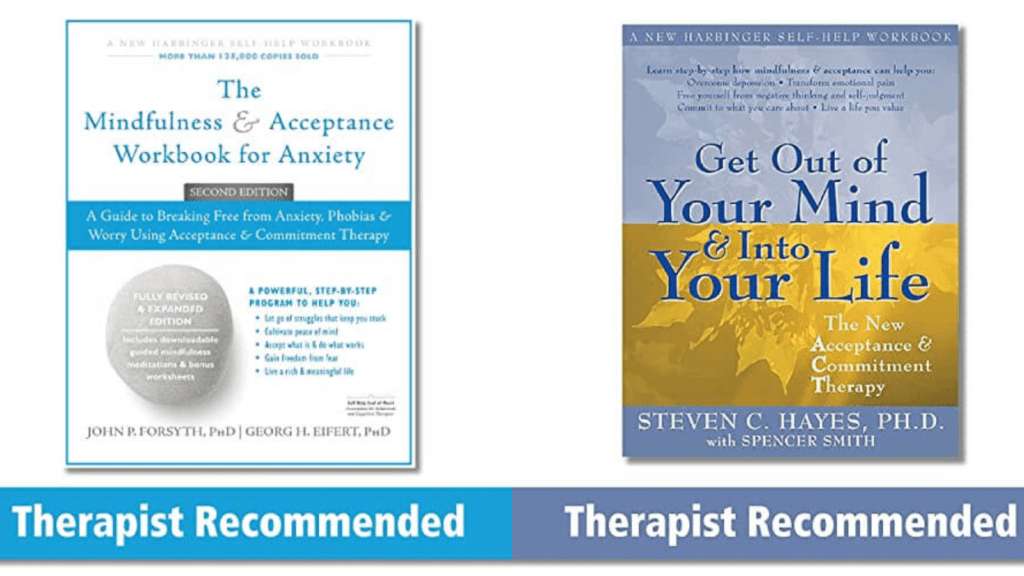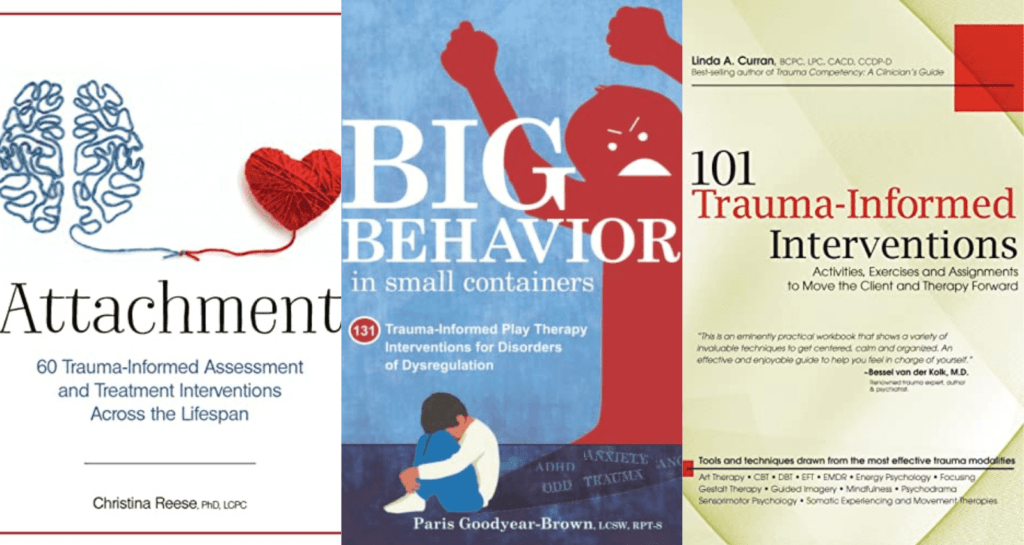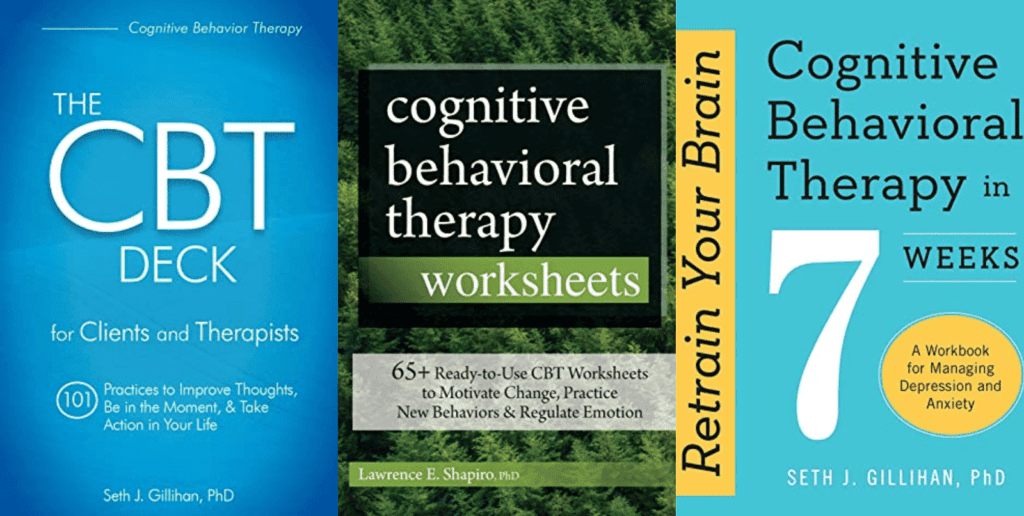The following are acceptance and commitment therapy books.
Disclosure: Some of the links below are affiliate links. This means that, at zero cost to you, I will earn an affiliate commission if you click through the link and finalize a purchase.
What Is Acceptance and commitment therapy (ACT)?
Acceptance and commitment therapy (ACT) is an action-oriented approach and a scientifically based psychotherapy that encourages individuals to welcome their thoughts and feelings rather than fighting or feeling shame for them.
ACT makes a distinction between pain and suffering: pain is a normal, unavoidable part of the human condition, but avoiding or trying to control painful experience is what causes of suffering.
Acceptance And Commitment Therapy Books

1. Get Out of Your Mind and Into Your Life
By Steven C. Hayes, Spencer Smith
In this book you will:
- Learn why the very nature of human language can cause suffering
- Escape the trap of avoidance
- Foster willingness to accept painful experience
- Practice mindfulness skills to achieve presence in the moment
- Discover the things you really value most
- Commit to living a vital, meaningful life
This book has been awarded The Association for Behavioral and Cognitive Therapies Self-Help Seal of Merit.
Related: Best 6 Mindfulness Exercises For Beginners (+FREE Resources)

2. The ACT Deck
By Timothy Gordon, Jessica Borushok
The ACT Deck offers 55 practices based on Acceptance and Commitment Therapy for use in therapy, classrooms or at home.
These cards ask tough questions, encourage meaningful action and provide new perspectives to help you let go of negative thoughts and live in the present moment.
Related: Best 8 Mindfulness Exercises For Adults That Will Help You Regulate Your Emotions

3. ACT Made Simple
By Russ Harris
A practical primer, ideal for ACT newcomers and experienced ACT professionals alike.
Inside, you’ll find:
- scripts, exercises, metaphors, and worksheets to use with your clients;
- a session-by-session guide to implementing ACT;
- transcripts from therapy sessions;
- guidance for creating your own therapeutic techniques and exercises; and
- practical tips to overcome “therapy roadblocks.”
Related: Best 10 Mental Health Coloring Books

4. Learning to Thrive
By Giulia Suro PhD
This Acceptance and Commitment Therapy workbook includes:
- A practical approach―Understand (and accept) yourself using a workbook that gives you the tools you need to make real, impactful changes.
- Solutions for everyday concerns―Apply the lessons of Acceptance and Commitment Therapy to specific parts of your life thanks to chapters focused around family, wellness, personal growth, and more.
- ACT made easy―Keep things simple with techniques written specifically for people new to Acceptance and Commitment Therapy―no psych textbooks needed.
Related: Best 10 Mindfulness Coloring Books

5. Reclaim Your Life
By Carissa Gustafson PsyD
This book about Acceptance and Commitment Therapy includes:
- The program―Apply the six core processes to each week and then bring them all together during the seventh and final week.
- Broad array of issues―Acceptance and Commitment Therapy can help with mental health issues like obsessive compulsive disorder (OCD), depression, anxiety, and post-traumatic stress disorder (PTSD).
- Hands-on―Use the six chapter lessons, worksheets, and exercises to learn each step of the process.
Related: How To Feel Your Feelings? Top 9 Difficult Emotions To Cope With In Healthy Ways

6. The Mindfulness and Acceptance Workbook for Anxiety
By John P. Forsyth, Georg H. Eifert
This workbook offers compelling new exercises to help you create the conditions for your own genuine happiness and peace of mind.
You’ll learn how your mind can trap you, keeping you stuck and struggling in anxiety and fear.
You’ll also discover ways to nurture your capacity for acceptance, mindfulness, kindness, and compassion, and use these qualities to weaken the power of anxiety and fear so that you can gain the space do what truly matters to you.
Related: Top 21 Emotional Writing Prompts To Process Emotions
Acceptance And Commitment Therapy Workbooks

7. The Mindfulness and Acceptance Workbook for Depression
By Kirk D. Strosahl PhD, Patricia J. Robinson PhD
This Workbook will show you how changing daily behaviors and practicing new mindfulness skills can literally reshape your brain.
Rather than fruitlessly trying to avoid your depression, you’ll learn to focus on living a productive life by accepting your feelings.
Using the skills outlined in this book, you’ll be able to work through your depression, experience greater peace and well-being, and go on to create a better life.
Related: What is Concealed Depression? (Effective 3-Step Guide To Overcome High Functioning Depression)

8. The ACT Workbook for Perfectionism
by Jennifer R. Kemp
Grounded in evidence-based acceptance and commitment therapy (ACT), this workbook offers an innovative approach to help you maintain your high standards while also accepting mistakes with compassion and kindness.
Related: Top 20 Practical Ways to Overcome Toxic Perfectionism (& Get Things Done)

9. The ACT Workbook for Depression and Shame
By Matthew McKay PhD, Michael Jason Greenberg PsyD, Patrick Fanning
Grounded in evidence-based acceptance and commitment therapy (ACT), this workbook will give you the tools to identify and dismiss your core beliefs of personal defectiveness, and build a life based on positive choices and values that bring vitality and a sense of personal fulfillment.
You’ll discover ways to develop psychological flexibility, freeing yourself from old habits and unhealthy coping mechanisms, and alleviating symptoms of depression.
Finally, you’ll learn to see yourself in all your wonderful complexity, with kindness and compassion.
Related: Top 10 Signs Of Toxic Shame In A Person (+Best 20 Healing Shame Exercises)

10. ACT Daily Journal
By Diana Hill PhD, Debbie Sorensen PhD
With The ACT Daily Journal, you’ll learn all about the six core processes of acceptance and commitment therapy (ACT)—including mindfulness, acceptance, and values-based living—and even learn about a seventh: self-compassion. If there was ever a time to adopt the ACT approach to living, it’s now.
By applying ACT to your life, you’ll learn how to roll with life’s punches, and stay in contact with the present moment, even when you have unpleasant thoughts, feelings, and bodily sensations.

How Acceptance And Commitment Therapy Books Can Help
Acceptance and Commitment Therapy (ACT) books can be incredibly helpful for anyone wanting to learn more about ACT or incorporate it into their own personal growth journey.
Here are a few ways in which ACT books can assist:
1. Understanding the principles: ACT books explain the core principles of ACT, such as mindfulness, acceptance, values, and committed action. They provide detailed explanations of these concepts, making it easier for individuals to understand the theory behind ACT.
2. Practical exercises and techniques: Most ACT books offer practical exercises and techniques that can be incorporated into daily life. These exercises help individuals cultivate mindfulness skills, practice acceptance, and engage in values-driven actions. The step-by-step instructions make it easier to apply these techniques in real-life situations.
3. Case studies and examples: Books on ACT often include case studies and examples to illustrate how ACT works in practice. These stories showcase how individuals have successfully applied ACT principles to overcome various challenges, making the concepts more relatable and easier to grasp.
4. Self-reflection and self-discovery: ACT books encourage self-reflection and self-discovery by asking thought-provoking questions and guiding individuals through introspective exercises. This helps readers gain a deeper understanding of their thoughts, emotions, and behaviors, enabling them to make positive changes in their lives.
5. Increased psychological flexibility: ACT emphasizes the development of psychological flexibility, which is the ability to adapt and respond effectively to life’s challenges. ACT books provide guidance on how to cultivate this flexibility, offering strategies and tools to help individuals let go of unhelpful thoughts and behaviors and move towards a more fulfilling life.
6. Professional guidance: While ACT books are a valuable resource for self-help, they can also benefit mental health professionals looking to incorporate ACT into their therapeutic practice. These books offer insights into the theory and techniques of ACT, providing therapists with additional resources to support their clients.

Conclusion
ACT books serve as informative guides that help individuals understand the principles of ACT, provide practical exercises and techniques, offer case studies and examples, promote self-reflection and self-discovery, enhance psychological flexibility, and aid mental health professionals in incorporating ACT into their practice.



